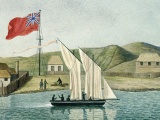1397 Geoffrey Chaucer told the Canterbury Tales for the first time at the court of Richard II.
1492 Spain and Christopher Columbus signed the Capitulations of Santa Fefor his voyage to Asia to acquire spices.
1521 Martin Luther spoke to the assembly at the Diet of Worms, refusing to recant his teachings.
1524 Giovanni da Verrazzano reached New York harbour.
1555 After 18 months of siege, Siena surrendered to the Florentine-Imperial army. The Republic of Siena was incorporated into the Grand Duchy of Tuscany.
1620 Marguerite Bourgeoys, founder of the Congregation of Notre Dame, was born (d. 1700) .
1797 Sir Ralph Abercromby attacked San Juan, Puerto Rico in what became one of the largest invasions of the Spanish territories in America.
1820 – The American sealer General Gates was sent to Sydney under guard.

1820 Alexander Joy Cartwright, Inventor of the Modern Game of Baseball, was born (d. 1892).
1837 J. P. Morgan, American financier, was born (d. 1913) .
1861 American Civil War: Virginia seceded from the United States.
1864 American Civil War: The Battle of Plymouth began.
1865 – Ursula Ledóchowska, Polish-Austrian nun and saint, founded the Congregation of the Ursulines of the Agonizing Heart of Jesus was born (d. 1939).
1865 Mary Surratt was arrested as a conspirator in the assassination of Abraham Lincoln.
1880 New Zealand’s first inter-city brass band contest was held.

1885 Karen Blixen (Isak Dinesen), Danish author, was born (d. 1962) .
1895 The Treaty of Shimonoseki between China and Japan was signed. This marked the end of the First Sino-Japanese War, the defeated Qing Empire was forced to renounce its claims on Korea and to concede the southern portion of the Fengtien province, Taiwan and the Pescadores Islands to Japan.
1905 The Supreme Court of the United States decided Lochner v. New Yorkwhich held that the “right to free contract” was implicit in the due process clause of the Fourteenth Amendment of the United States Constitution.
1907 The Ellis Island immigration centre processed 11,747 people, more than on any other day.
1916 – Win Maung, 3rd President of Union of Myanmar, was born (d. 1989).
1918 William Holden, American actor, was born (d. 1981).
1924 – Metro-Goldwyn-Mayer studios was formed by the merger of Metro Pictures, Goldwyn Pictures, and the Louis B. Mayer Company.
1925 – René Moawad, Lebanese lawyer and politician, 13th President of Lebanon, was born (d. 1989).
1929 James Last, German band leader, was born.
1941 World War II: The Kingdom of Yugoslavia surrendered to Germany.
1942 French prisoner of war General Henri Giraud escaped from his castle prison in Festung Königstein.
1945 Brazilian forces liberated the town of Montese, Italy, from German forces.
1946 – Clare Francis, English sailor and author, was born.
1949 At midnight 26 Irish counties officially left the British Commonwealth. A 21-gun salute on O’Connell Bridge, Dublin, ushered in the Republic of Ireland.
1957 Nick Hornby, English author, was born.
1961 Bay of Pigs Invasion: A group of CIA financed and trained Cuban refugees landed at the Bay of Pigs in Cuba with the aim of ousting Fidel Castro.
1964 The Ford Motor Company unveiled the Ford Mustang at the New York World’s Fair.
1964 Jerrie Mock became the first woman to circumnavigate the world by air.
1969 Sirhan Sirhan was convicted of assassinating Robert F. Kennedy.
1969 Czechoslovakian Communist Party chairman Alexander Dubček was deposed.
1970 Apollo 13 returned to Earth safely.
1971 The People’s Republic of Bangladesh formed, under Sheikh Mujibur Rahman.
1971 Sierra Leone became a republic.
1973 German counter-terrorist unit GSG 9 founded.
1974 Victoria Beckham, English singer (Spice Girls), was born.
1975 The Cambodian Civil War ended. The Khmer Rouge captureed the capital Phnom Penh and Cambodian government forces surrendered.
1982 Patriation of the Canadian constitution in Ottawa.
1984 Police Constable Yvonne Fletcher was killed by gunfire from the Libyan People’s Bureau in London during a small demonstration outside the embassy. Ten others were wounded.
1986 The Three Hundred and Thirty Five Years’ War between the Netherlands and the Isles of Scilly ended.
2006 – Sami Hammad, a Palestinian suicide bomber, detonated an explosive device in Tel Aviv, killing 11 people and injuring 70.
2012 – Ilias Ali, organizing secretary of Bangladesh Nationalist Party and a former MP, disappeared from Dhaka with his chauffeur, allegedly abducted by government forces.
2013 – An explosion at a fertiliser plant in the city of West, Texas, kills 15 people and injures 160 others.
2014 – NASA’s Kepler confirmed the discovery of the first Earth-size planetin the habitable zone of another star.
Sourced from NZ History Online & Wikipedia



 Posted by homepaddock
Posted by homepaddock 

